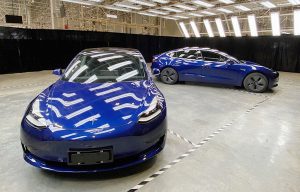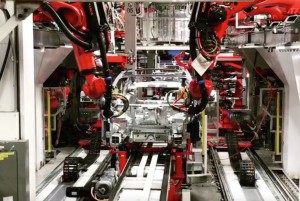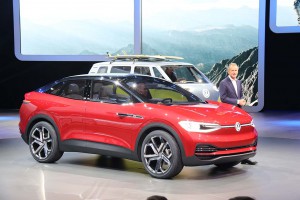
Tesla may switch to a different type of battery for its Model 3 sedans in China. (Photo credit: JayinShanghai/Twitter)
China’s desire to have more electric vehicles roaming its streets is getting automakers to examine how to meet those demands while cutting costs, and two of the biggest – Tesla and Volkswagen – may switch to a different battery to make that happen.
Tesla reportedly is in the final stages of discussions with CATL to become its source for its China-produced Model 3 sedans using lithium-iron-phosphate, or LFP, batteries, according to Reuters. Typically, the EV maker uses nickel-cobalt-aluminum cells for its vehicles.
However, the California-based EV maker has been looking to cut its reliance on cobalt-based batteries. CEO Elon Musk said in mid-2018 the company’s cells used just 3% cobalt and the next-generation would free of the very pricey material. Cobalt costs $33,500 a metric ton and the supply chain is complicated, Reuters and others have noted.
(Tesla looking to raise $2 billion through stock sale.)
The move to LFP batteries will reduce costs, they are about 20% less expensive overall. Additionally, the batteries last longer and can be charged and discharged at higher power levels making them more durable.

Tesla is looking for ways to cut costs on the Model 3 in China so it can lower prices and the new LFP batteries are less expensive.
Additionally, they handle heat better than their contemporary nickel-cobalt-based counterparts. This allows for more creative packaging in vehicles. In fact, they are commonplace in buses and other large commercial vehicles for those reasons.
The downsides are that they are heavier, and perhaps most importantly, they don’t have the range that the NCA and NCM (nickel-cobalt-manganese) batteries offer – again, offset to some degree by how the cells are packed in the vehicle.
The degradation isn’t severe, but in China the decline will be acceptable – still a range in excess of 250 miles on a full charge – and gives Tesla and others time to improve the energy density of the LFP offering.
(Tesla stock sets new high, surging past $900 a share.)
Tesla’s not the only automaker making some form of commitment to switch to LFP batteries in China, Volkswagen is doing the same. VW may not limit the use of LFP batteries to China in the near term, potentially using them to power its standard-range ID.3 and other EVs in Europe and the United States. However, the German automaker’s long-range vehicles will most likely still require nickel-cobalt-based batteries to ensure they can push well beyond the 300-mile range.
Moving toward the LFP batteries may help Tesla address another problem it faces: battery
production capacity. Musk noted during the company’s most recent earnings call last month that one of his top priorities is finding ways for the company to simply make more batteries.
He noted that one of the reasons their won’t be significant production numbers of the Cybertruck and the Semi truck is that they require significantly more batteries than their more mainstream counterparts, including the about-to-be-delivered Model Y compact SUVs. Those smaller vehicles pay the bills and put the EV maker in the black, which makes shareholders happy.
Additionally, the move to LFP batteries in China helps Musk meet another one of its goals: cutting the price on the Model 3 to attract more buyers. “We’re trying to make the cars as affordable as possible as fast as possible while remaining (profitable),” he said during the same call.
(Tesla sets new production record, posts small loss for 2019.)
In fact, battery technology is so important, according to Musk, he revealed during that call the company is going to outline its plans and new technologies for analysts and others during a battery-day event sometime in the near future.

